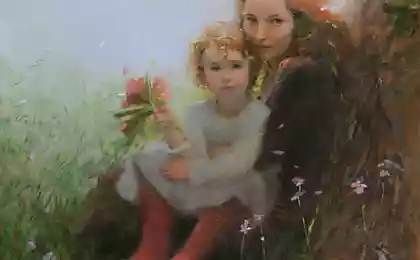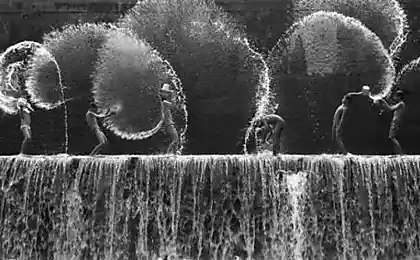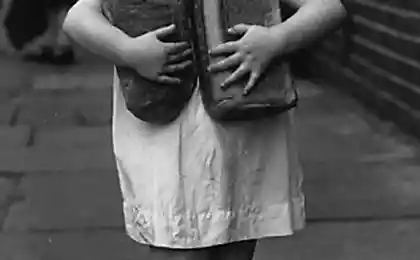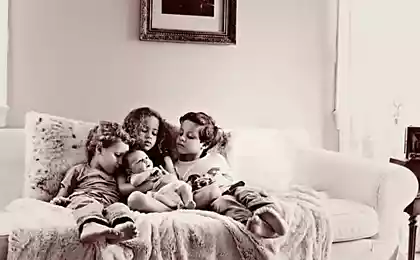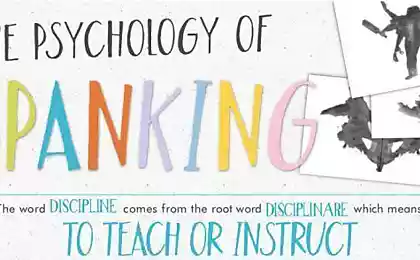788
Nurturing Chad: how our ancestors nurtured children
In ancient times, children nurtured. So now they bring up, nurture, educate and cultivate...
Nurturing is a process of setting up parents to the biorhythms of the child and setting the child on a biofield of the Earth. It turns out that all of the old Slavonic “games for the little ones” (“magpie-crow”, “three wells”, “latuszek”) — and not the game at all, and therapeutic procedures on the basis of acupuncture.
If you just swaddle the baby, wash and feed them — you care for it.
If you say something like: “Oh, my sweet! Let's handle this here, but the last one in the cuffs. And now we're going to wear a diaper” — you bring it up: because people need to know that you love him, communicate with him and even time ever to start a conversation.
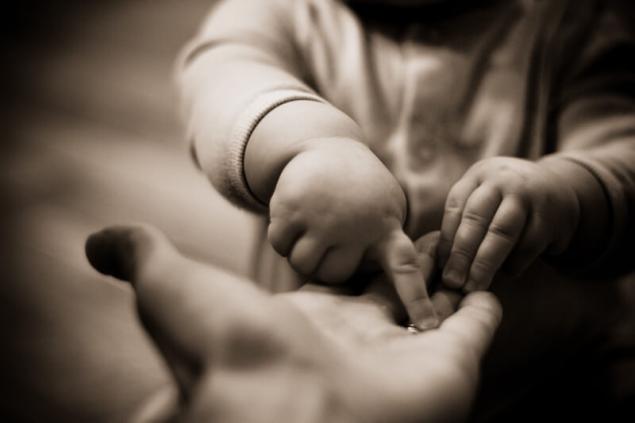
But if you, our child, say pestushko like:
Vodicka, vodicka,
Wash my face — That eyes gleaming
So cheeks were burning,
To laugh rotok
So bite the clove.
Now, if you stuffed a baby these pregovorima-Petushki, then you set the rhythm, join in the General energy flow of the earth. On earth everything is subordinated to specific rhythms: respiration, circulation, hormone production... Day and night, lunar months, tides. Every cell is in its rhythm. On the way, and are conspiracies from disease: the sorcerers catch “healthy pace” and adjust his aching body. So for every sore — your verse.
The best folklore samples help parents to make their communication with the child is more rich in emotional and aesthetic terms. Today, however, they are not used in communicating with the baby. What is behind the mysterious concept of "nurturing" baby? And whether it's a modern moms?
Emotional communication is one of the leading lines of development of the young child, starting from the first months of his life. Affectionate mother's touch, her voice, singing, loving the look of the first game combined with the poetic word – this is called called capacious word – folklore. Folk pedagogy consists of small genres of poetry for children: pestushko, nursery rhymes, nursery rhymes, sayings, and so They formed the basis of maternal education, proven over the centuries. And one can only wonder at people's genius, managed to Express in poetry the great power of maternal love.
GREAT-GRANDMOTHER'S WORD
Folk pedagogy has developed its own traditional folklore genres for the little ones. All of them are simple in content and simple in form, however, fraught with considerable aesthetic and didactic (from the Greek. didaktikуs — edifying) dignity. Simple rhymes, repetitive sound combinations and words, exclamations and emotional abuse inadvertently cause the baby to listen, to stand still for a moment, staring at the face of the speaker. The unique identity of the folklore is especially valuable for the revitalization of the child in the period when he had not yet formed arbitrary acts, reaction to the words.
It should be noted that all the genres correspond to the psychophysical capabilities of a small child, so you can use them now, focusing on micropurity early childhood — from birth to 3 months.; from 3 to 6 months. 6-9 months.; 9-12 months. Newborn baby grows "by leaps and bounds". Kid intense is changed every three months, therefore, provides a new, more difficult challenges in mastering the movements of body and hands, speech skills, emotional expression, cognitive reactions to the world and, of course, of communicative opportunities in the communication with adults. Interestingly, each named macroperiod you can pick up people's pieces that are suited to it genetically determined objectives. This also applies to the 2nd and 3rd years of life.
Pestushko, nursery rhymes, nursery rhymes, tongue twisters, stories and shifters, differing from each other in their pedagogical orientation, is introduced into the child's life in different ways, depending on age.
PETUSHKI
Petushki include play interaction with the child, when an adult performs the movement "for him", playing with his hands and legs. The baby can still be available such move as the body turns, he can't purposefully act with his hands, not able to sit, crawl, stand at the pillar — all this will come within the 1st year of life. It was during this period the mother nurse the baby: playing his hands, stroking the baby's tummy, making topotushki his legs. Awakened the baby, the mother caresses, touching with light massage movements, gentle says:
"Pothukuchi,
Paratunski,
Across tolstushki,
And legs of hodonice
And in pen — hatouski,
And in rotok — patter,
And in head — rezumat".
Massage, turns heads, he flips knobs on the head, pomahivaya hands with my mother's help, etc. are not only physically healthier for the baby, but also gives him a lot of pleasure. If mom having fun says:
"Meshu, meshu dough
Furnace is in place
Bake, bake a loaf!
Golovenko — go ahead, go ahead!" — the events causing the child emotional "spike", the need to communicate with adults, and most importantly, a desire to repeat the same motions that he can't even do yourself. With each re-playing mother feels the growing activity in the execution of movements from the baby. Listening to the gentle recitative mom, tiny anticipates motion, laughs and is already framing the head, extend the arms, pull legs, etc., waiting for the familiar turn in the game. So with the help of pastuszek game starts "training" baby.
Also entertaining for the kids swing on the leg "jumps" and movement on mother's or father's lap, grandmother, depicting a horse race riding a mountain, dance, etc. of Course, these games are helpful for kids to be older when the baby already knows how good to sit and rise independently on legs:
Go on, go on
Nuts, nuts!
Jumped, jumped
With the rolls, with the rolls!
Skipping prikocko
Over bumps, over bumps — In the hole — wham!
An adult throws a child on my knees, and then pretends that lowers down (squeezes knees again and puts on the "horse" ("sleigh", "truck", etc.).
Good road,
Good road,
Here was something worse
Here was something worse
Salaat, playing,
Salaat, playing,
On the bridge, under the bridge
On the bridge, under the bridge
Buch in a hole!
Useful child, prepare to master the walk.
Toki-Toki-Toshka,
Forge, forge legs.
Legs at Antoshka
Go on the track,
Track curve,
No end or edge.
Reciting rhymed lines, mother alternately pochlebiac lying on the back of the kid's footsteps, which reflexively respond to a light touch. It's like the adult creates a sense of rhythm walk in the steps of one or the other leg.
When the child begins to master the walk, come to the aid of other Petushki, for example:
TA-TA-TA, TA-TA-TA,
Went cat for the cat;
The cat goes to the bench
Leads the cat's paws,
Tops-tops on a bench
DACs-DACs for paws.
Saying these verses, the mother holding her hand and, stepping back, carefully leading him along. The rhythm of the verse and sets the rhythm of the walk: "tops-tops", "DACs-DACs" coincide with the steps, crosses the child. Baby you can drive in another way: an adult holds him from behind by the armpits, and, legs wide apart, encourages cross legs.
Big feet
Walking down the road:
Top-top-top,
Top-top-top.
Little feet
Ran on the track:
Top-top-top, top — top-top!
Top-top-top, top-top-top!
Entertaining for the child and Petushki, through which he learns to do rhythmic patting palms. Adult bows baby hands and converge them, says:
"Okay-okay,
Where have you been? — Annushka.
What they ate? — Pancakes.
Where are the pancakes? — Ate ...
No crumpet!" (The child's hands apart).
The game goes on. An adult offers to go to Panicke:
Okay-okay,
Where have you been? —Panicky.
What they ate? -Gingerbread!
Where is the gingerbread?
Ate...
There is no gingerbread! (The child's hands apart).
Then adult offers "to go" to Mikeska is nuts, then Troske eat potatoes, and then to Senecca for seeds (similar). The important thing is that by playing the child learns the word "okay" to fold her hands and perform game movements with their arms to the rhythm of the songs.
Nursery RHYMES
Gradually Petushki replaced poteshkami — the so-called songs-are the sentences that accompany the game fingers, arms, head, legs. From pastuszek nursery rhymes are different in that they are designed for the activity of the child, which performs independently motion, correlating them with the content of the songs-nursery rhymes: movement of fingers, twisting of palms ("lanterns"), Pat handles ("okay"), attaching the fingers to the head ("ears"), etc.
For example, poteshka "okay, Okay" is presented to the child to teach the child to perform a series circuit, games of action, when a child makes handles "lanterns", then slams the palms.
Okay, okay!
Where have you been?
My grandmother.
What did you eat?
Porridge.
Drank?
Prostokvashu.
Prostokvasha vkusnenko,
Porridge, honey,
The pious grandmother!
Drank, ate, Shu-u-u...
Home flew,
The crown sat,
Okay sang. (The kid throws his pen, makes smahivanija and puts her hands to the head).
In letting simple poem you can put any name: it is important that the kid understood that we are talking about it. It will be very interesting if mom will play this letting simple poem in front of him with a doll:
Pussy, pussy, pussy, scat!
On the track don't sit down:
Let our Dolly go,
Through the pussy will fall! (A toy cat placed on the way walking doll, and then removed).
For kids the beginning of the 2nd year of life, selected rhymes that not only understood little by its content, but also reflect his normal daily routine: feeding, sleeping, bathing, playing, etc. Well, if adults possess a folklore word and can to colour it, emotionally enriching, it would seem quite everyday situations. Playing with the child, helping to stand up, you can say:
"Dyboc, diboc,
Soon Sasha godok!
Diboc-diboc! A whole year!"
Bathing the baby, mom affectionately says:
"Water is fluid,
Child rastochie.
Water off a duck,
With the baby leanness!
Water down
And child up!"
Dressing the baby for a walk, mom can entertain the following lines:
Our Mary (Dasha, Sasha, Katya) is small,
Her coat Alenka,
The edge of the beaver,
Mary black-browed.
The desire of spouses, nannies to raise the child strong, healthy and well-fed gave rise to many sayings, with which they tried to feed the baby to drink the milk, buy a pie, enjoy pancakes, kiselica, etc.
Came jelly,
On the bench sat down,
On the bench sat down,
To eat Olya told.
Love, affection and maternal tenderness expressed in these lines:
Our child in the garden
Like the Apple in honey!
It is important that the mother smiled and her speech was very emotional:
On duboce, duboce
Here sit two of the dove.
They have the blue neck,
They have feathers of gold,
Red kaftanci,
Blue pockets
On the oak tree they sit,
Among themselves they say:
All about Galenika
All about small...
Since then, how did these nursery rhymes, many years have passed, and still they have not lost their relevance. And today children as well as at all times, expect their close attention, care, love, expressed not only in actions, but in kind words. It is not only important to love the baby, but to be able to emotionally, a bright and beautiful way to Express your feeling. People's word — the consummate "teacher": that's why adults need to master the techniques of folk art and talking with the baby, skillfully "weave" them in everyday speech.
You should take into account that a young child is meaningful not just talk, stories about something or someone. He needs to be complicit in what is happening and to hear from adult direct appeal to themselves, to feel mom, dad or grandma, etc. in a particular situation, to understand their mood at the moment.
Bright cottage?
Increased Lizusha!
People love her,
All her golubac.
Option for a boy:
Who at us good?
Who at us nice?
Kolya is good
Kolya nice.
You can Pat the child on the head, hold hands and dance with everyone. published
P. S. And remember, only by changing their consumption — together we change the world! ©
Join us in Facebook , Vkontakte, Odnoklassniki
Source: vk.com/kluchuspexu?w=wall-52793525_15434%2Fall
Nurturing is a process of setting up parents to the biorhythms of the child and setting the child on a biofield of the Earth. It turns out that all of the old Slavonic “games for the little ones” (“magpie-crow”, “three wells”, “latuszek”) — and not the game at all, and therapeutic procedures on the basis of acupuncture.
If you just swaddle the baby, wash and feed them — you care for it.
If you say something like: “Oh, my sweet! Let's handle this here, but the last one in the cuffs. And now we're going to wear a diaper” — you bring it up: because people need to know that you love him, communicate with him and even time ever to start a conversation.

But if you, our child, say pestushko like:
Vodicka, vodicka,
Wash my face — That eyes gleaming
So cheeks were burning,
To laugh rotok
So bite the clove.
Now, if you stuffed a baby these pregovorima-Petushki, then you set the rhythm, join in the General energy flow of the earth. On earth everything is subordinated to specific rhythms: respiration, circulation, hormone production... Day and night, lunar months, tides. Every cell is in its rhythm. On the way, and are conspiracies from disease: the sorcerers catch “healthy pace” and adjust his aching body. So for every sore — your verse.
The best folklore samples help parents to make their communication with the child is more rich in emotional and aesthetic terms. Today, however, they are not used in communicating with the baby. What is behind the mysterious concept of "nurturing" baby? And whether it's a modern moms?
Emotional communication is one of the leading lines of development of the young child, starting from the first months of his life. Affectionate mother's touch, her voice, singing, loving the look of the first game combined with the poetic word – this is called called capacious word – folklore. Folk pedagogy consists of small genres of poetry for children: pestushko, nursery rhymes, nursery rhymes, sayings, and so They formed the basis of maternal education, proven over the centuries. And one can only wonder at people's genius, managed to Express in poetry the great power of maternal love.
GREAT-GRANDMOTHER'S WORD
Folk pedagogy has developed its own traditional folklore genres for the little ones. All of them are simple in content and simple in form, however, fraught with considerable aesthetic and didactic (from the Greek. didaktikуs — edifying) dignity. Simple rhymes, repetitive sound combinations and words, exclamations and emotional abuse inadvertently cause the baby to listen, to stand still for a moment, staring at the face of the speaker. The unique identity of the folklore is especially valuable for the revitalization of the child in the period when he had not yet formed arbitrary acts, reaction to the words.
It should be noted that all the genres correspond to the psychophysical capabilities of a small child, so you can use them now, focusing on micropurity early childhood — from birth to 3 months.; from 3 to 6 months. 6-9 months.; 9-12 months. Newborn baby grows "by leaps and bounds". Kid intense is changed every three months, therefore, provides a new, more difficult challenges in mastering the movements of body and hands, speech skills, emotional expression, cognitive reactions to the world and, of course, of communicative opportunities in the communication with adults. Interestingly, each named macroperiod you can pick up people's pieces that are suited to it genetically determined objectives. This also applies to the 2nd and 3rd years of life.
Pestushko, nursery rhymes, nursery rhymes, tongue twisters, stories and shifters, differing from each other in their pedagogical orientation, is introduced into the child's life in different ways, depending on age.
PETUSHKI
Petushki include play interaction with the child, when an adult performs the movement "for him", playing with his hands and legs. The baby can still be available such move as the body turns, he can't purposefully act with his hands, not able to sit, crawl, stand at the pillar — all this will come within the 1st year of life. It was during this period the mother nurse the baby: playing his hands, stroking the baby's tummy, making topotushki his legs. Awakened the baby, the mother caresses, touching with light massage movements, gentle says:
"Pothukuchi,
Paratunski,
Across tolstushki,
And legs of hodonice
And in pen — hatouski,
And in rotok — patter,
And in head — rezumat".
Massage, turns heads, he flips knobs on the head, pomahivaya hands with my mother's help, etc. are not only physically healthier for the baby, but also gives him a lot of pleasure. If mom having fun says:
"Meshu, meshu dough
Furnace is in place
Bake, bake a loaf!
Golovenko — go ahead, go ahead!" — the events causing the child emotional "spike", the need to communicate with adults, and most importantly, a desire to repeat the same motions that he can't even do yourself. With each re-playing mother feels the growing activity in the execution of movements from the baby. Listening to the gentle recitative mom, tiny anticipates motion, laughs and is already framing the head, extend the arms, pull legs, etc., waiting for the familiar turn in the game. So with the help of pastuszek game starts "training" baby.
Also entertaining for the kids swing on the leg "jumps" and movement on mother's or father's lap, grandmother, depicting a horse race riding a mountain, dance, etc. of Course, these games are helpful for kids to be older when the baby already knows how good to sit and rise independently on legs:
Go on, go on
Nuts, nuts!
Jumped, jumped
With the rolls, with the rolls!
Skipping prikocko
Over bumps, over bumps — In the hole — wham!
An adult throws a child on my knees, and then pretends that lowers down (squeezes knees again and puts on the "horse" ("sleigh", "truck", etc.).
Good road,
Good road,
Here was something worse
Here was something worse
Salaat, playing,
Salaat, playing,
On the bridge, under the bridge
On the bridge, under the bridge
Buch in a hole!
Useful child, prepare to master the walk.
Toki-Toki-Toshka,
Forge, forge legs.
Legs at Antoshka
Go on the track,
Track curve,
No end or edge.
Reciting rhymed lines, mother alternately pochlebiac lying on the back of the kid's footsteps, which reflexively respond to a light touch. It's like the adult creates a sense of rhythm walk in the steps of one or the other leg.
When the child begins to master the walk, come to the aid of other Petushki, for example:
TA-TA-TA, TA-TA-TA,
Went cat for the cat;
The cat goes to the bench
Leads the cat's paws,
Tops-tops on a bench
DACs-DACs for paws.
Saying these verses, the mother holding her hand and, stepping back, carefully leading him along. The rhythm of the verse and sets the rhythm of the walk: "tops-tops", "DACs-DACs" coincide with the steps, crosses the child. Baby you can drive in another way: an adult holds him from behind by the armpits, and, legs wide apart, encourages cross legs.
Big feet
Walking down the road:
Top-top-top,
Top-top-top.
Little feet
Ran on the track:
Top-top-top, top — top-top!
Top-top-top, top-top-top!
Entertaining for the child and Petushki, through which he learns to do rhythmic patting palms. Adult bows baby hands and converge them, says:
"Okay-okay,
Where have you been? — Annushka.
What they ate? — Pancakes.
Where are the pancakes? — Ate ...
No crumpet!" (The child's hands apart).
The game goes on. An adult offers to go to Panicke:
Okay-okay,
Where have you been? —Panicky.
What they ate? -Gingerbread!
Where is the gingerbread?
Ate...
There is no gingerbread! (The child's hands apart).
Then adult offers "to go" to Mikeska is nuts, then Troske eat potatoes, and then to Senecca for seeds (similar). The important thing is that by playing the child learns the word "okay" to fold her hands and perform game movements with their arms to the rhythm of the songs.
Nursery RHYMES
Gradually Petushki replaced poteshkami — the so-called songs-are the sentences that accompany the game fingers, arms, head, legs. From pastuszek nursery rhymes are different in that they are designed for the activity of the child, which performs independently motion, correlating them with the content of the songs-nursery rhymes: movement of fingers, twisting of palms ("lanterns"), Pat handles ("okay"), attaching the fingers to the head ("ears"), etc.
For example, poteshka "okay, Okay" is presented to the child to teach the child to perform a series circuit, games of action, when a child makes handles "lanterns", then slams the palms.
Okay, okay!
Where have you been?
My grandmother.
What did you eat?
Porridge.
Drank?
Prostokvashu.
Prostokvasha vkusnenko,
Porridge, honey,
The pious grandmother!
Drank, ate, Shu-u-u...
Home flew,
The crown sat,
Okay sang. (The kid throws his pen, makes smahivanija and puts her hands to the head).
In letting simple poem you can put any name: it is important that the kid understood that we are talking about it. It will be very interesting if mom will play this letting simple poem in front of him with a doll:
Pussy, pussy, pussy, scat!
On the track don't sit down:
Let our Dolly go,
Through the pussy will fall! (A toy cat placed on the way walking doll, and then removed).
For kids the beginning of the 2nd year of life, selected rhymes that not only understood little by its content, but also reflect his normal daily routine: feeding, sleeping, bathing, playing, etc. Well, if adults possess a folklore word and can to colour it, emotionally enriching, it would seem quite everyday situations. Playing with the child, helping to stand up, you can say:
"Dyboc, diboc,
Soon Sasha godok!
Diboc-diboc! A whole year!"
Bathing the baby, mom affectionately says:
"Water is fluid,
Child rastochie.
Water off a duck,
With the baby leanness!
Water down
And child up!"
Dressing the baby for a walk, mom can entertain the following lines:
Our Mary (Dasha, Sasha, Katya) is small,
Her coat Alenka,
The edge of the beaver,
Mary black-browed.
The desire of spouses, nannies to raise the child strong, healthy and well-fed gave rise to many sayings, with which they tried to feed the baby to drink the milk, buy a pie, enjoy pancakes, kiselica, etc.
Came jelly,
On the bench sat down,
On the bench sat down,
To eat Olya told.
Love, affection and maternal tenderness expressed in these lines:
Our child in the garden
Like the Apple in honey!
It is important that the mother smiled and her speech was very emotional:
On duboce, duboce
Here sit two of the dove.
They have the blue neck,
They have feathers of gold,
Red kaftanci,
Blue pockets
On the oak tree they sit,
Among themselves they say:
All about Galenika
All about small...
Since then, how did these nursery rhymes, many years have passed, and still they have not lost their relevance. And today children as well as at all times, expect their close attention, care, love, expressed not only in actions, but in kind words. It is not only important to love the baby, but to be able to emotionally, a bright and beautiful way to Express your feeling. People's word — the consummate "teacher": that's why adults need to master the techniques of folk art and talking with the baby, skillfully "weave" them in everyday speech.
You should take into account that a young child is meaningful not just talk, stories about something or someone. He needs to be complicit in what is happening and to hear from adult direct appeal to themselves, to feel mom, dad or grandma, etc. in a particular situation, to understand their mood at the moment.
Bright cottage?
Increased Lizusha!
People love her,
All her golubac.
Option for a boy:
Who at us good?
Who at us nice?
Kolya is good
Kolya nice.
You can Pat the child on the head, hold hands and dance with everyone. published
P. S. And remember, only by changing their consumption — together we change the world! ©
Join us in Facebook , Vkontakte, Odnoklassniki
Source: vk.com/kluchuspexu?w=wall-52793525_15434%2Fall
Motherhood is not the only calling of a woman.
Alkaline water will help to normalize the acid-alkaline balance of Your body









